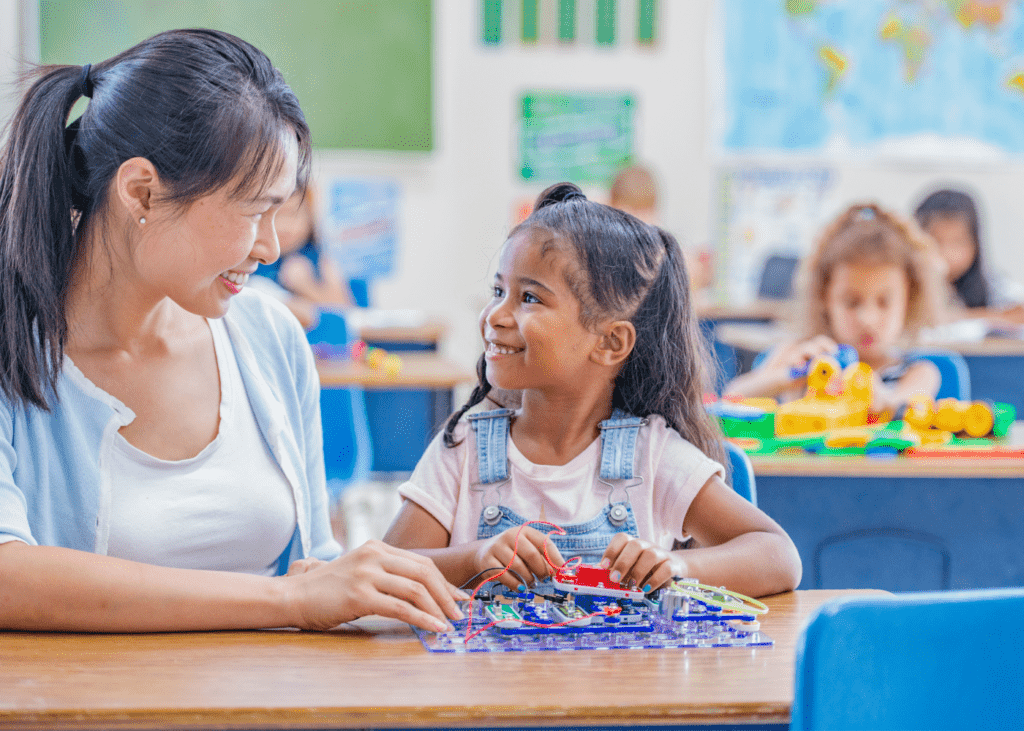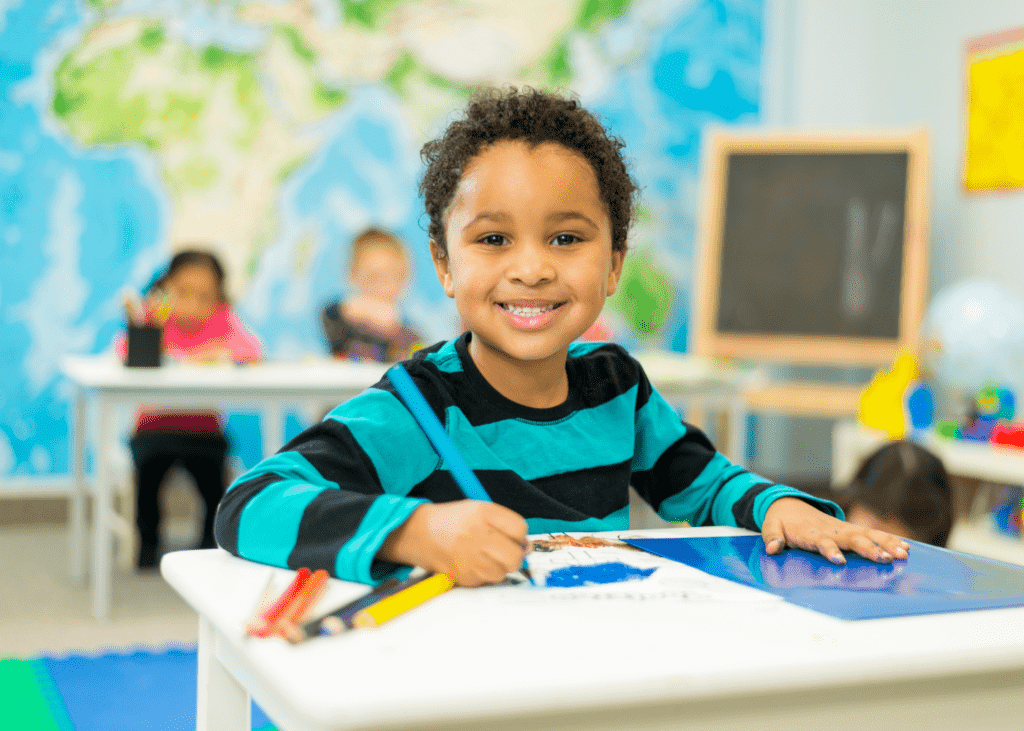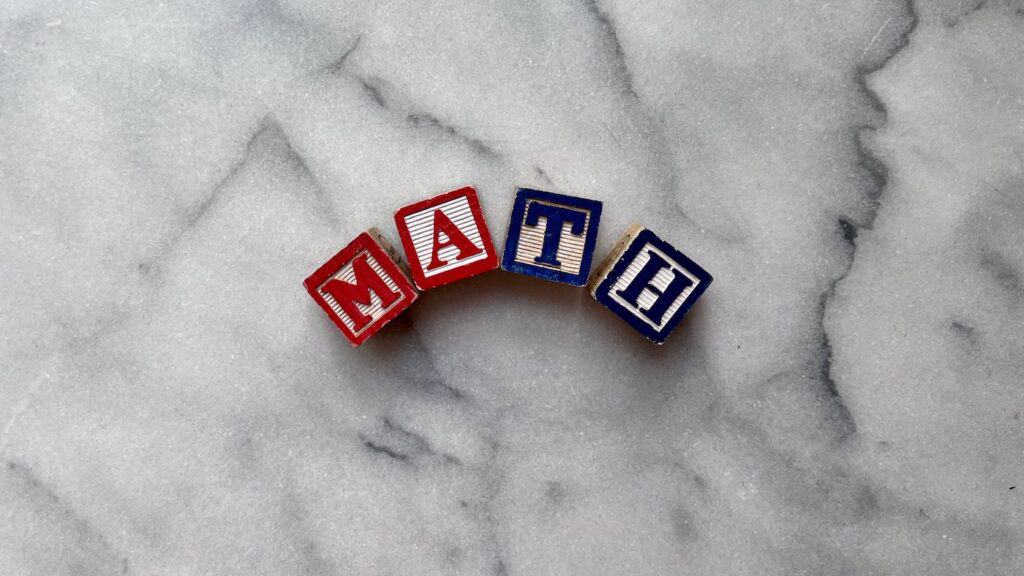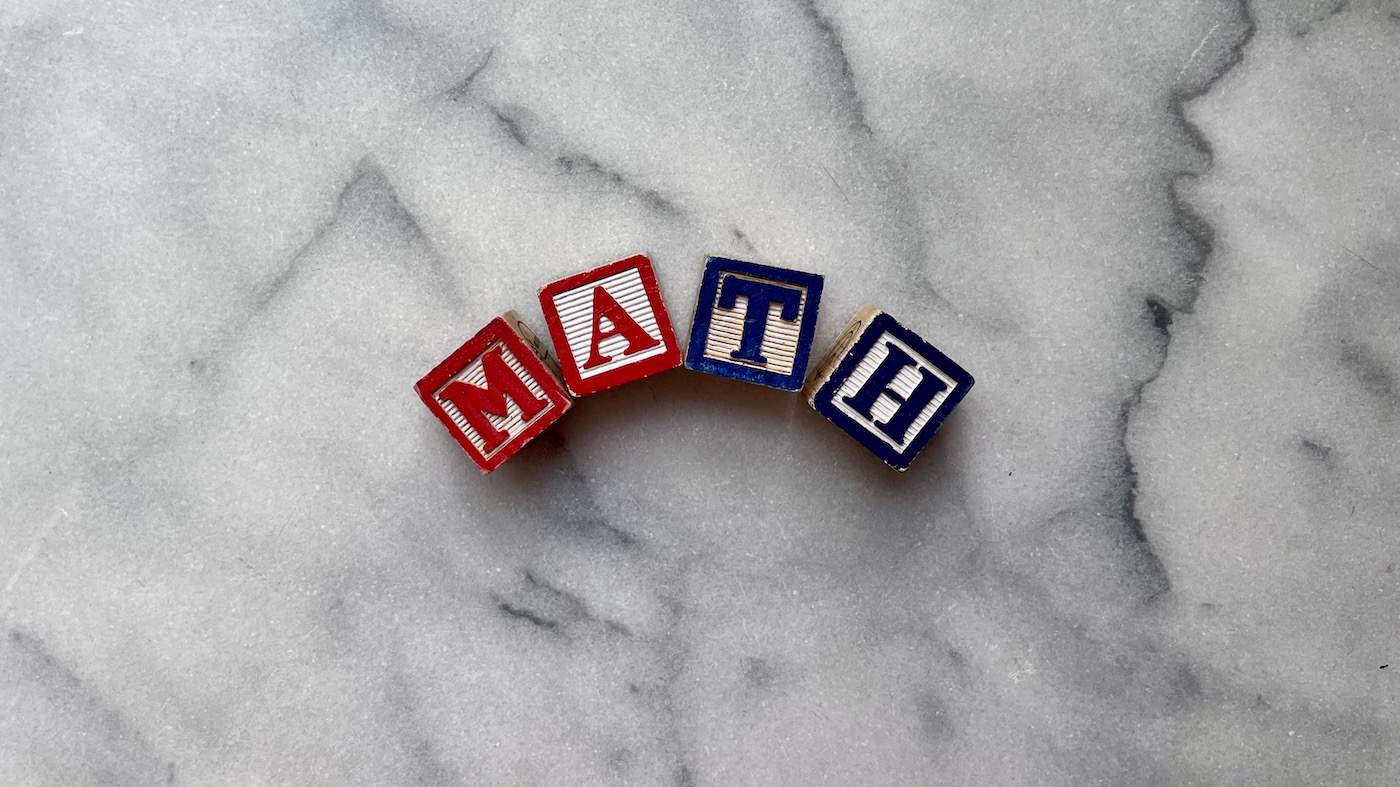In a preschool math class, children will learn basic concepts such as numbers, shapes, and measurements. They will also begin to develop problem-solving skills and an understanding of basic mathematical operations. But, what will they learn in Kindergarten?
Understanding what your kiddos will learn in Kindergarten is important so you can support their learning at home. Or, if your kiddos are homeschooled, you may be wondering which skills they will need to learn in their Kindergarten year. So, here are the essential math concepts taught at the Kindergarten level.
My top teacher tip for math with young children? Keep it fun! It’s extremely important that learning math is a positive experience. This encourages enthusiasm for math (and helps prevent math anxiety later in life).

Kindergarten math concepts: What will they learn?
During their preschool years, children will have learned basic concepts such as numbers, shapes, and measurements. They will also have begun to develop problem-solving skills and an understanding of basic mathematical operations. These early math concepts helped prepare them for Kindergarten, where basic math concepts are explored at a deeper level.
Here’s a look at the BC Kindergarten math curriculum, so you have an idea of what they learn.
By practicing important math skills early on, and working to reinforce concepts throughout their Kindergarten year, your child will be better equipped to succeed in school and in life. This is just one of the 10 important reasons that Allison Master, PhD, finds math important.
Why is Kindergarten math important?
Kindergarten math concepts are important because they help children develop strong mathematics foundations. These foundations will be necessary as they begin to learn more advanced mathematics concepts later in school. Additionally, Kindergarten math can help children develop problem-solving and critical thinking skills. By learning how to count, identify patterns, and solve simple problems, children can begin to develop the mathematical skills they need to be successful in school and in life.
The basics: Numbers, shapes, and measurements
Pre-school math typically covers the basics of numbers, shapes, measurements, and the likeliness of events. Children learn to identify, count, and manipulate numbers 1-10, as well as to recognize common shapes such as circles, squares, and triangles. They also begin to develop an understanding of basic measurements such as length, width, and height.
These concepts lay the foundation for more advanced mathematics concepts that children will learn in school. Math in the early years also covers how to understand time, money, and patterns among other important math skills! Additionally, by understanding the basics of numbers, shapes, and measurements, children can begin to develop problem-solving and critical thinking skills.
Why learning basic math concepts is important for your child
I may have hinted at this once or twice, but Kindergarten math is important for your child because it helps them develop strong mathematics foundations. After all, math is all around us! Regardless of how we feel amount math (trust me – I didn’t start enjoying it until teacher’s college!), we use fundamental mathematical concepts every single day.
Hint: Have you ever bought groceries, planned an exciting trip, or watched a sports game? They all use basic math skills!
The foundations learned in Kindergarten will be necessary as they begin to learn more advanced mathematics concepts in their elementary school education. Additionally, math can help children develop problem-solving, critical thinking, and reasoning skills. By learning how to count, identify patterns, complete simple addition, and solve simple problems, children can begin to develop the skills they need to be successful in school and in life.
Problem-solving skills: Developing a logical mindset
One of the most important skills that children can develop through the Kindergarten math curriculum is problem-solving. By learning how to identify patterns and solve simple problems, children can begin to develop a logical mindset. This is important for young learners because it helps increase academic performance, confidence, creativity, and self-esteem, according to Mrs. Meyer’s Learning Lab.
The skills learned in Kindergarten will be essential as they encounter more complex mathematical problems later in life. Having a strong foundation in mathematics will therefore help them learn other math skills down the road. Additionally, problem-solving skills can help children develop critical thinking skills. By learning how to break down problems and find solutions, children can begin to think more critically about the world around them (while getting more resilient in their learning, too!).

Number sense: Understanding quantity and value
Another important part of Kindergarten math is developing number sense. This involves understanding quantity and value. If I were to say it in teacher talk, I would say they learn ‘one-to-one correspondence’ – Basically, this number concept teaches that a number has a corresponding value (for example, one object = 1).
Children also learn to identify and count numbers while developing their rote counting abilities. Rote counting is the ability to memorize numbers and repeat them (displayed by counting 1-10 in sequential order).
Addition and subtraction are other abilities your kiddos will practice in Kindergarten. At this age, the number manipulation is pretty basic. Stick with numbers under 10! For example, you could ask your child questions like “You have two apples and add three more. How many apples do you have in total?” At this age, using manipulatives (real objects) is super important. By using objects, you can help children understand the very abstract concept of counting. If you don’t have apples, use wooden blocks! (Or whatever else is available).
Patterns: Recognizing and creating order
Pattern recognition is another important part of Kindergarten math. By learning to identify patterns, children can begin to develop a sense of order. This lets them organize information in a logical way while learning to identify different shapes and sort objects. Plus, pattern identification is important for more than just math – This is also a foundational skill for reading (rhyming, predicting text) and music, among other subjects!
Measurements: Understanding size, weight, and capacity
Measurements are a part of our daily life. From weighing out our groceries to picking the correct size of clothing while shopping, we rely on these concepts a lot. Children learn to understand basic concepts such as length, width, and height. Understanding physical objects is a skill that they will continue to explore throughout their elementary experience (and high school, too!). So, enhancing the child’s understanding of measurement at a young age is a foundational skill, too.
Geometry: Understanding basic shapes
Children will also learn to identify and understand basic geometric shapes such as squares, circles, and triangles. Since shapes are all around us and are more concrete than abstract concepts like numbers, this can easily be practiced day to day. In everyday interactions, this might look like recognizing different objects as shapes. Ask your child questions like “what shape is this ball?” to help them practice this. At this age, it’s all about keeping it fun!
Mathematical operations: Addition, subtraction, multiplication, and division
Mathematical operations are first taught at the pre-K level, starting with basic math activities and easy math concepts. In Kindergarten, children will learn to understand and perform basic operations such as addition and subtraction. In the early years of elementary school, they will begin exploring more complicated concepts, like multiplication and division.
A big part of this stage is developing the appropriate language (more than, less than, how many in total). As they practice counting and become confident at it, you can start incorporating basic addition into daily routines. Again, use manipulatives (hands-on activities) as much as you can and keep it fun!
They will also practice skip counting, which is basically counting in groups, like counting by 2’s or 5’s. Not only is this a basic part of adding and subtracting, but it’s a foundational skill for multiplication down the road.
They are also ready to write numbers at this stage, which helps with number recognition. You can practice this skill through fun activities like making numbers from play do then writing them down.
Putting it all together: Using math in everyday life
Kindergarten-aged kids are learning so much. In order to keep it fun and exciting, it’s important to make practicing math a part of their daily routine. Just like it takes a ton of practice to read, write, and speak, Kindergarten math skills require a lot of repetition!
If you consistently make math a part of your everyday life, it won’t feel like such a daunting task for your kiddos. Number sense doesn’t need to be taught in worksheets and by rote memorization. Children learn best when they’re having fun, anyway! Judy Willis did a pretty cool study on the neuroscience behind this – Read it here!

Conclusion
Kindergarten math concepts are important because they help children practice many skills that are a part of early child development. Critical thinking and problem-solving skills are among the most important of these! The basics of numbers, shapes, and measurements also lay the foundation for more complex mathematical operations such as addition, subtraction, multiplication, and division. By understanding and using math in everyday life, children can develop a better understanding of the world around them.
By encouraging children to practice their skills through fun math activities, children understand big ideas in a way that makes sense to them. If you are working with young children, it’s important to look for fun ways to teach math – You could sing songs or play games, for example. This keeps learning fun and helps children understand the world around them through play.
In Kindergarten, you can expect that your children will learn the basics of addition and subtraction, how to recognize shapes, how to count and manipulate small numbers, the basics of financial literacy and telling time, how to predict the likelihood of future events, and basic graphing (among other skills).
In conclusion, Kindergarten math is essential in preparing children for kindergarten and beyond. By teaching them the basics of numbers, shapes, and measurements, they will be better equipped to understand more advanced concepts that they will encounter in school and in life.
BTW, if you’re working on learning math and money, we’ve created some free worksheets. Get them here!
Other posts about math
Looking for another math-related post? You may enjoy one of the articles below!
- Easy DIY kindergarten sorting activities
- Kindergarten math word problems
- Free number tracing worksheets (Numbers 1-10)
- Tally mark worksheets (with free printable!)
- Ways to teach preschool math in nature (with free printable)
- 10 Nature counting activities for preschoolers
- Simple sorting activities for preschoolers


Leave a Reply